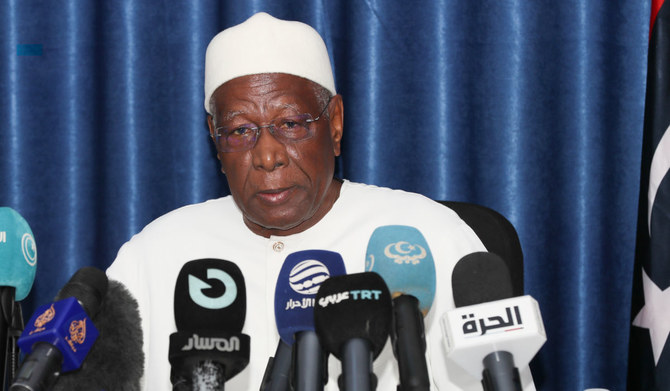

In a joint effort to address Libya’s ongoing political challenges, Libyan House of Representatives (HoR) Speaker Aguila Saleh and the Special Representative of the UN Secretary-General for Libya, Abdoulaye Bathily, emphasized the urgent need for a unified government to pave the way for general elections in Libya.
During discussions held on Saturday in Qubba, eastern Libya, Bathily took to the social media platform X (formerly known as Twitter) to share the outcome of their meeting. Bathily underscored the significance of “conducting elections under a unified government supported by key stakeholders,” reflecting a shared commitment to achieving a stable and democratic future for Libya.
Following their deliberations, the HoR issued an official statement in which Speaker Aguila Saleh highlighted the necessity of establishing a new government, replacing the current Government of National Unity (GNU), with the primary goal of expediting both presidential and parliamentary elections.
It’s important to note that Libya had originally planned to hold general elections in December 2021.
However, these plans were disrupted due to disputes among political parties regarding election laws.
In January, Libyan Prime Minister Abdul-Hamed Dbeibah conveyed his government’s readiness to oversee general elections in 2023.
The HoR, established following the 2014 Libyan parliamentary election, has played a pivotal legislative role in the country’s tumultuous political landscape. Notably, it relocated to Tobruk in eastern Libya in late 2014 following the occupation of Tripoli by armed groups during the Second Libyan Civil War.
Between 2014 and 2021, the HoR threw its support behind the government in Tobruk, led by Abdullah al-Thani, before endorsing the Government of National Unity (GNU) led by Dbeibeh.
In a significant turn of events in September 2021, the HoR passed a vote of no confidence against the interim GNU government.
Since the fall of Muammar Gaddafi’s regime in 2011, Libya has grappled with the formidable task of achieving a democratic transition, characterized by violence and deep-seated political divisions. The ongoing efforts to establish a unified government and hold elections represent crucial steps toward stability and reconciliation in the country
more recommended stories
 Somaliland President Meets UK Diplomats to Discuss Future Cooperation and Investment Opportunities
Somaliland President Meets UK Diplomats to Discuss Future Cooperation and Investment OpportunitiesPresident Cirro Meets Outgoing and Incoming.
 President Cirro Reaffirms Somaliland’s Sovereignty in Meeting with Top UN Humanitarian Official
President Cirro Reaffirms Somaliland’s Sovereignty in Meeting with Top UN Humanitarian OfficialHargeisa, Somaliland – April 6, 2025:President.
 Somaliland’s Berbera Industrial Park: A New Era of Investment and Job Creation
Somaliland’s Berbera Industrial Park: A New Era of Investment and Job CreationThe Government of Somaliland, under the.
 𝗙𝗼𝗿𝗺𝗲𝗿 𝗣𝗿𝗲𝘀𝗶𝗱𝗲𝗻𝘁 𝗠𝘂𝘀𝗲 𝗕𝗶𝗵𝗶’𝘀 𝗥𝗲𝗰𝗸𝗹𝗲𝘀𝘀 𝗔𝗰𝘁𝗶𝗼𝗻𝘀 𝗠𝘂𝘀𝘁 𝗡𝗼𝘁 𝗕𝗲 𝗜𝗴𝗻𝗼𝗿𝗲𝗱 – Abdihalim Musa
𝗙𝗼𝗿𝗺𝗲𝗿 𝗣𝗿𝗲𝘀𝗶𝗱𝗲𝗻𝘁 𝗠𝘂𝘀𝗲 𝗕𝗶𝗵𝗶’𝘀 𝗥𝗲𝗰𝗸𝗹𝗲𝘀𝘀 𝗔𝗰𝘁𝗶𝗼𝗻𝘀 𝗠𝘂𝘀𝘁 𝗡𝗼𝘁 𝗕𝗲 𝗜𝗴𝗻𝗼𝗿𝗲𝗱 – Abdihalim MusaYesterday, Somaliland witnessed a deeply troubling.

